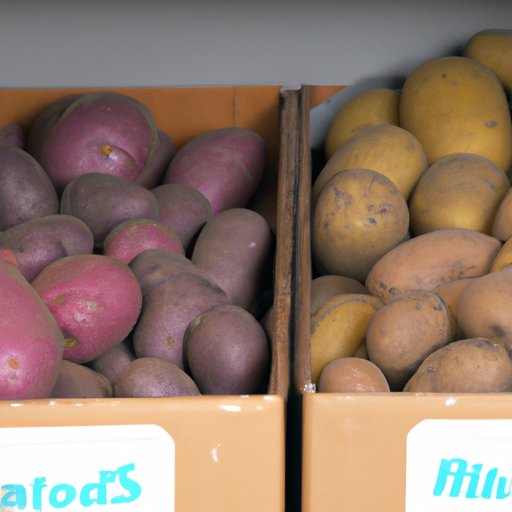
Introduction
Potatoes are a staple in many households and are used in a wide variety of recipes. Whether you prefer fries, mashed, or roasted potatoes, it’s important to know how to store them correctly to ensure they stay fresh for as long as possible. Proper potato storage not only saves you money in the long run but also helps to prevent food waste. In this article, we’ll cover the basics of potato storage, as well as some tips and tricks for extending the shelf life of your potatoes.
The Basics of Properly Storing Potatoes: Tips and Tricks
The first step in proper potato storage is understanding why it’s important. Potatoes can spoil quickly if not stored correctly. This can result in mold, soft spots, and a bad odor. In some cases, potatoes can even sprout, which can be a sign that they’re no longer fresh. To avoid these issues, it’s crucial to store your potatoes properly.
When stored incorrectly, potatoes can actually release a gas that causes them to go bad even faster. This gas, called ethylene, can also cause other fruits and vegetables to ripen and spoil more quickly if they’re stored with potatoes. So, it’s best to keep your potatoes separate from other produce.
To prevent ethylene gas from accumulating in your potatoes, it’s important to store them in a cool, dark place. This means avoiding areas like windowsills or countertops that are exposed to direct sunlight or heat.
Other tips and tricks for proper potato storage include keeping them dry, avoiding plastic bags, and never storing them in the refrigerator. We’ll cover these methods and more in the following sections.
Top 5 Ways to Store Potatoes and Keep Them Fresh
Method #1: Storing in a cool, dark place
As previously mentioned, storing potatoes in a cool, dark place can help to keep them fresh for longer. This can be achieved by placing them in a pantry, cabinet, or cellar. The ideal temperature for potato storage is around 45-50°F.
Method #2: Keeping potatoes away from other vegetables and fruits
As we mentioned earlier, ethylene gas can cause potatoes to go bad faster and can also impact other produce. To prevent this, keep your potatoes separate from other fruits and vegetables.
Method #3: Using a breathable container
To keep potatoes dry and prevent them from going soft, use a breathable container like a mesh bag or a cardboard box. You can also wrap them in paper towels before placing them in the container to absorb excess moisture.
Method #4: Storing in a root cellar or basement
If you have a root cellar or basement, this is an ideal place to store potatoes. These areas are generally cool, dark, and well-ventilated, which helps to extend the shelf life of your potatoes.
Method #5: Using a refrigerator (with a caveat)
While it’s generally not recommended to store potatoes in the refrigerator, there is one exception. If you’ve partially cooked your potatoes and plan on using them within a few days, storing them in the fridge can help to prevent spoilage. Just make sure they’re fully cooked before taking them out of the fridge for use.
Preventing Potato Waste: How to Store Potatoes for Longer Shelf Life
Proper potato storage not only saves you money but can also help to reduce food waste. By extending the shelf life of your potatoes, you’ll be able to use them in a wider range of recipes before they go bad.
To extend the shelf life of your potatoes, follow these tips:
– Store them in a cool, dark place
– Keep them dry and avoid excess moisture
– Avoid plastic bags, which can cause condensation and promote mold growth
– Remove any sprouts or green spots before storing
– Check your potatoes regularly and discard any that are going bad
How to Make Potatoes Last: The Dos and Don’ts of Potato Storage
There are a few “rules” of potato storage to keep in mind when trying to preserve their freshness. These include:
Dos:
– Store them in a cool, dark place
– Keep them dry
– Use a breathable container
– Check them regularly and remove any that are going bad
Don’ts:
– Store them in the refrigerator (unless partially cooked)
– Keep them in plastic bags
– Store them near onions or fruits and vegetables that release ethylene gas
Environmentally-Friendly Potato Storage Methods
When looking to store potatoes sustainably, there are a few tips and tricks to keep in mind. These include:
– Use reusable or biodegradable storage containers
– Store potatoes in a well-ventilated area to reduce the need for artificial cooling
– Use alternative storage methods like a root cellar or outdoor cold frame
By following these tips, you can reduce your environmental impact while also keeping your potatoes fresh.
The Science of Storing Potatoes: New Discoveries and Tips
Scientific research has led to new discoveries in potato storage techniques. For example, the use of specific commercial coatings has been found to extend the shelf life of potatoes. Additionally, some studies have found that storing potatoes in high carbon dioxide environments can help to prevent sprouting.
By keeping up-to-date on the latest research, you can ensure your potato storage techniques are as effective as possible.
Conclusion
Proper potato storage is crucial to prevent spoilage and extend the shelf life of your potatoes. By following these tips and tricks, you can keep your potatoes fresh and reduce food waste. Additionally, sustainable storage methods can help to reduce your environmental impact.





